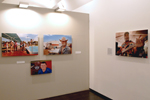Australia,
sulle tracce di Chatwin venti anni dopo Le Vie dei Canti
Palazzo Ducale, Genova
Australia, on Chatwin's footsteps twenty years
after The Songlines
Palazzo Ducale, Genoa


Rhythm’n’bush.
Lo scorso luglio Leslie Thompson è stato nominato Rocker of the
Month dal Winanjjikari Music Centre di Tennant Creek. Leslie è
un Warumungu, l’etnia autoctona dominante della regione del Barkly,
il frontman - basso, chitarra, voce - dei The Guys Here. Nella superequipaggiata
sala del centro, consolle da trenta canali e casse da 200 watt, sta perfezionando
con i compagni del gruppo la registrazione della loro ultima canzone.
«Si chiama Rain, parla del Sogno della mia gente, dell’attesa
dell’acqua dal cielo dopo mesi di sole che cuoce». Due accordi
di chitarra d’accompagnamento, ritmica essenziale di basso e batteria,
voce che modula roca, qualche svisata della Stratocaster. È country,
sembra di essere in piena provincia americana. Ma, naturalmente, l’universo
musicale aborigeno è vario: rock urbano, didgeridoo, reggae, hip
hop. Si assimila, si riutilizza, si mescola. Non c’è un “autentico”
indigeno, quello è per chi va a caccia di esotico. Si riprova per
l’ultima volta la traccia per chitarra solista, il chitarrista deve
andare via, lavora in una cattle station lontana, è ora di tornare
a occuparsi del bestiame. Gli altri si concedono un diversivo, mettendo
su una session con il tecnico del suono alla batteria. Passano con buona
energia da Long train running dei Doobie Brothers e Let’s spend
the night together dei Rolling Stones a un canto di sole voci nella lingua
dei padri. Musica occidentale ascoltata da sempre, qui come a Londra o
in Sudafrica, memoria di suoni tradizionali, incroci vari. La regola -
se c’è - è contaminazione, pluralità. Sono
tanti i ritmi del bush